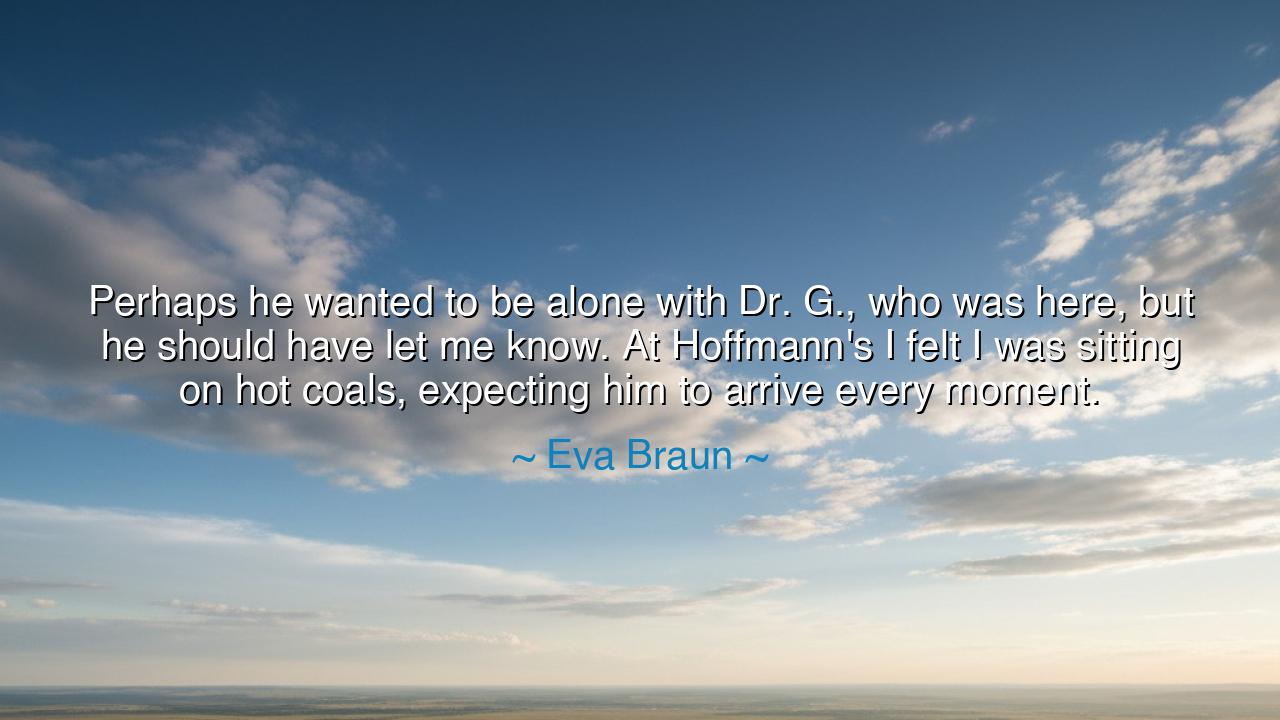
Perhaps he wanted to be alone with Dr. G., who was here, but he
Perhaps he wanted to be alone with Dr. G., who was here, but he should have let me know. At Hoffmann's I felt I was sitting on hot coals, expecting him to arrive every moment.






When Eva Braun wrote, “Perhaps he wanted to be alone with Dr. G., who was here, but he should have let me know. At Hoffmann’s I felt I was sitting on hot coals, expecting him to arrive every moment,” she was not composing poetry, but her words have since echoed through history like a lament whispered from the edge of darkness. In them we find not the musings of a great thinker or philosopher, but the aching voice of a woman trapped between love and loneliness — a private cry from within one of the most monstrous chapters of human history. These words, drawn from her diaries, reveal the tender and tortured heart of isolation, of longing, and of devotion to a man who was both the object of her affection and the architect of destruction.
Eva Braun was the long-time companion and, briefly, wife of Adolf Hitler. She lived her life in secrecy and confinement, forbidden from public acknowledgment, bound by the shadow of his power. The letter-like entry in which she writes these words was penned during one of Hitler’s absences, when he spent time with his inner circle — notably Dr. Joseph Goebbels, his minister of propaganda. Eva’s tone is one of pain disguised as patience, of yearning veiled in restraint. She writes not as one abandoned entirely, but as one left in the half-light of emotional neglect. The line “I felt I was sitting on hot coals” burns with the restlessness of love unreturned, of loyalty met with indifference. It is the confession of a soul consumed not by hatred, but by the slow fire of invisibility.
To the ancients, this kind of sorrow was not unknown. They wrote of queens and consorts who lived in the shadows of great men — women whose hearts bore the weight of history’s cold indifference. The Greeks told of Penelope, who waited faithfully for Odysseus’s return, weaving and unweaving her tapestry in solitude. Yet unlike Penelope, Eva’s vigil was not one of hope or virtue, but of despair and entrapment. Her “hero” was not lost at sea but lost to his own delusions. Still, the ache of waiting, the torment of uncertainty, binds both women across time. This pain, though personal, becomes a mirror to the universal truth that love, when unbalanced, becomes a form of imprisonment.
There is a deeper tragedy beneath Eva’s words. Though her devotion was misplaced, it was real — and therein lies the human paradox: that love can survive even in the service of evil. She lived among the halls of power yet remained powerless, surrounded by grandeur yet consumed by loneliness. In her lament, one can hear the ancient warning that proximity to greatness without equality breeds despair. Eva’s longing for a simple gesture — a message, a word, a sign that she mattered — speaks to the eternal human need for recognition, for connection, for love that is mutual and seen.
History has often condemned Eva Braun, and perhaps rightly so, for the life she chose and the man she adored. Yet her words remind us that even within the darkest lives there exists a flicker of humanity — twisted, flawed, but real. Her shame, her yearning, her self-doubt reveal a woman consumed not by ideology but by emotional dependence. It is the story of how love, when bound to power, becomes a chain — and how devotion, when placed upon an unworthy object, leads only to emptiness.
Let this story be a lesson to those who live in the shadow of others: never surrender the entirety of your heart to someone who does not see it. Love, when stripped of dignity, becomes suffering. The ancients would say, “Do not worship the mortal as though he were divine, for the gods are jealous of such folly.” Eva’s quiet pain stands as a testament to that truth. Even the most intimate devotion, when given without measure, can become a kind of death — the slow extinction of the self in the flame of another’s indifference.
So, my children, remember this: love must never silence the soul. To wait endlessly for someone who does not come is to waste one’s life upon absence. Speak, demand, live — for love that requires you to vanish is not love, but shadow. Eva Braun’s final words from her diary carry the mournful wisdom of experience: that longing without reciprocation becomes torment, and that to give all of oneself to another’s silence is to lose the music of one’s own heart. Learn, then, to love bravely, but never blindly — for even the softest heart can burn upon the coals of neglect.






AAdministratorAdministrator
Welcome, honored guests. Please leave a comment, we will respond soon